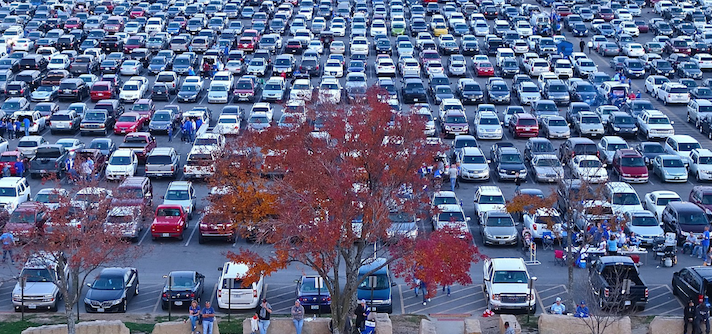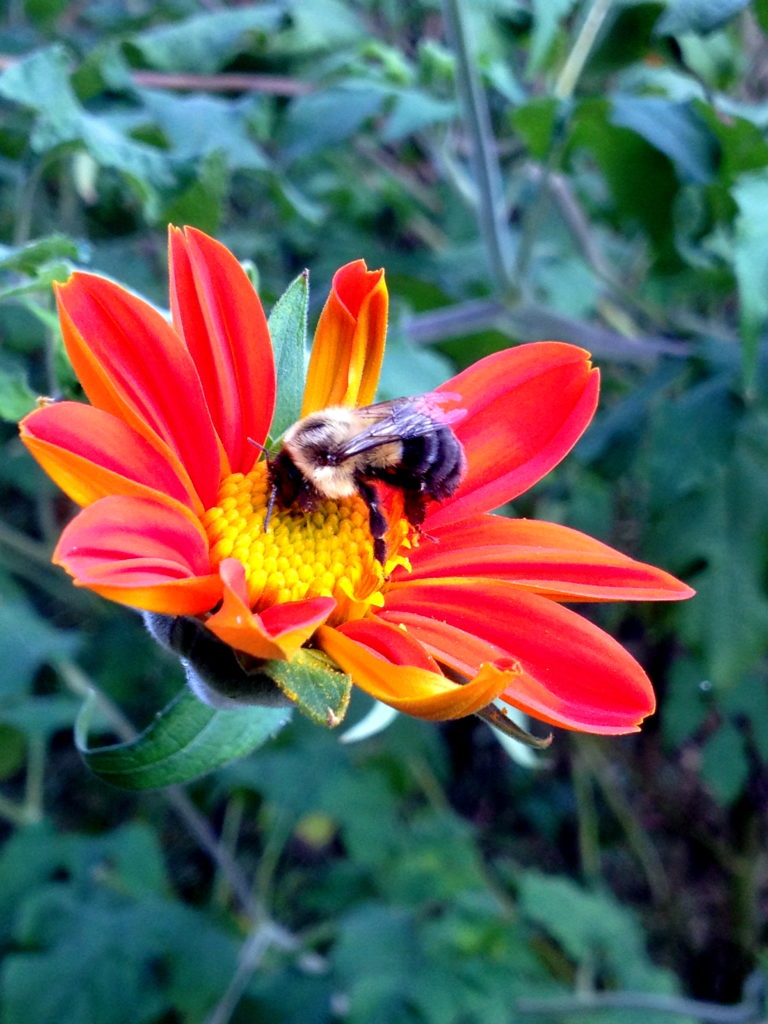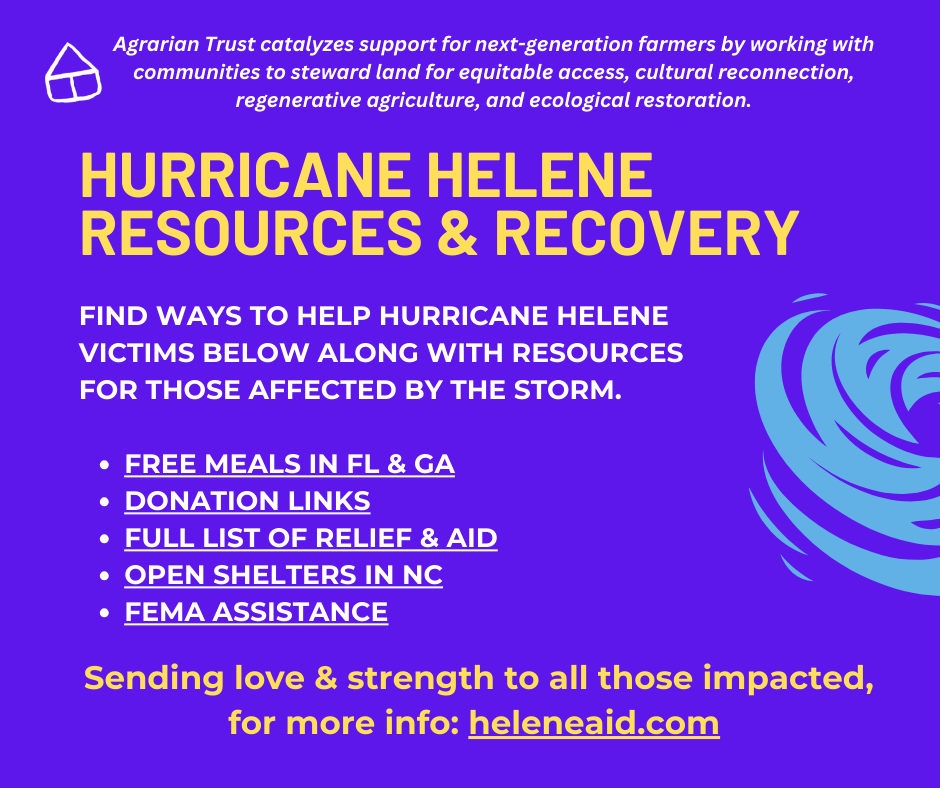Like many farm-adjacent folks, I am a huge fan of the singer-songwriter, octave hopping, heart-string-tugging extraordinaire, Joni Mitchell. Her vocal skill, complex instrumental arrangements, and ability to carry raw emotions in a few choice words have captivated the hearts of countless fans, and profoundly influenced the face of folk music today.

If you’ve been following the news or have a foot in the folk world, you’ve likely heard that Mitchell recently made a surprise appearance at the Newport Folk Festival. As a result of this unexpected, but thoroughly gratifying development, many fans and critics are revisiting the master songwriter’s work. I had the recent pleasure of encountering one of Joni Mitchell’s most famous pieces, “Big Yellow Taxi” (1970), through a key feature of Agrarian Trust’s mission—land, and how we relate it.
If you’re racking your brain for what song I’m talking about, think paradise, paving, and parking lots. Listen:
Don’t it always seem to go
That you don’t know what you’ve got
Till it’s gone
They paved paradise
And put up a parking lot
Oooh, ba ba ba, and so on. Throughout the song’s four verses, Mitchell issues a scathing critique of consumerism, our increasing disconnection with the natural world, and our reckless use of poisonous chemicals such as DDT. Instead of standing by as paradise is lost, she asks us to think critically about what our values are, and how these values are reflected in our use of the land.
I can’t get enough.
Mitchell says she was inspired to write “Big Yellow Taxi” on a trip to Hawaii. In a 2019 issue of Mojo Magazine, Mitchell recalls, “I took a taxi to the hotel and when I woke up the next morning, I threw back the curtains and saw these beautiful green mountains in the distance. Then, I looked down and there was a parking lot as far as the eye could see, and it broke my heart—this blight on paradise. That’s when I sat down and wrote the song.” Most of us have probably had some kind of experience like this, even if we weren’t in Hawaii, or looking directly at a parking lot. The strength of Mitchell’s song lay in its ability to unite its listeners in this shared sense of loss.
In the 35 years before Big Yellow Taxi was released, the United States lost over five million farms, or more than half of the farms that existed in 1935.
After all, there’s something deeply unsettling about looking at our natural world—in all its rich, complex beauty–-and seeing it reduced to a simple tool for human consumption. The “parking lot” metaphor could be anything. It could be a front lawn, a monoculture crop, or a golf course. Paradise, on the other hand, might be a meadow of wildflowers, a biodiverse farm, or an old growth forest. When we look at the developed world around us, we’re often forced to ask ourselves, what have we lost?
One sight that has become conspicuously absent from modern life is the small, biodiverse farm. In the 35 years before Big Yellow Taxi was released, the United States lost over five million farms, or more than half of the farms that existed in 1935. While the United States certainly has never been a paradise—most of these lost farms were stolen from Native Americans in the first place—this loss has had dire consequences for rural economies. As small farms disappear, we’ve seen an explosion of industrial farming practices that favor monoculture over diversity, productivity over soil health, and profit over community well-being.
Today, we’re not just losing farms—we’re losing farmland. According to a policy report by National Young Farmers Coalition, “Since 1982, developers have bulldozed, paved, and built homes on farmland across the country, permanently removing 25 million acres of land from farming—an area roughly the size of Indiana. This trend continues at a rate of more than 2,000 acres per day.” American Farmland Trust estimates that if this development pattern continues, another 18.4 million acres will be lost between 2016 and 2040.
If we want to preserve farmland for future generations, we need to recognize what we have and do everything we can to sustain it while it’s here.
There’s nothing inherently wrong with development. Sometimes it makes more sense to build, for example, a new grocery store than it does to preserve a piece of farmland. But development with no regard for the well-being of the region’s ecology, food system, and community is an entirely different, and far more dangerous beast. The loss of farmland, for example, has caused land prices to skyrocket, making it more and more difficult for new farmers to access land and contribute to functional food systems.

Mitchell laments, “Don’t it always seem to go, that you don’t know what you’ve got till it’s gone?” I hope not. If we want to preserve farmland for future generations, we need to recognize what we have and do everything we can to sustain it while it’s here.
The Agrarian Commons represents a major step in this direction. By giving communities the tools they need to purchase land, to ensure its continued responsible use, and to manage it collectively, the Agrarian Commons empowers us to make conscious choices about how we use our land. With enough support, the Commons can serve as a model for a new way of relating with the land that replaces profit-motivated development with collective decision-making, environmental health, and a deep commitment to social justice. So let’s put away the metaphorical (and not-so-metaphorical) DDT, keep the spots on our apples, and save the birds and bees. Please.




